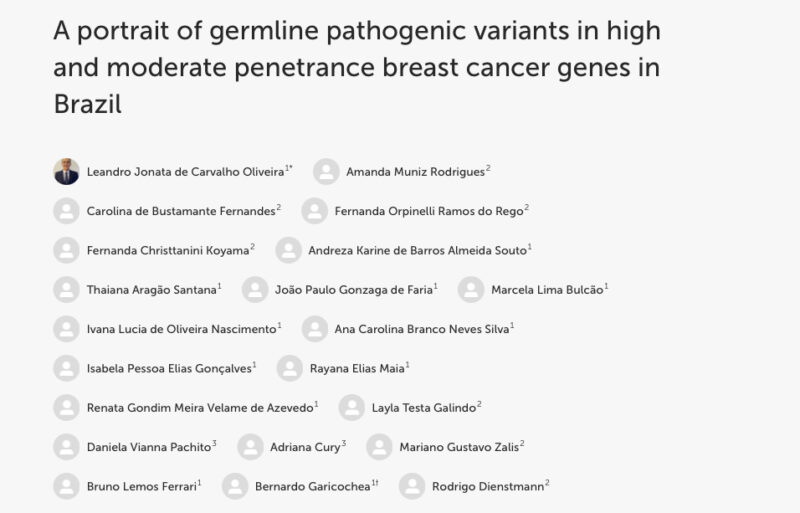Germline Pathogenic Variants in High and Moderate Penetrance Breast Cancer Genes in Brazil
Breast cancer is the most common cancer type among women worldwide and the leading cause of cancer-related deaths. About 10% of all breast cancer cases are hereditary, and nearly half of these are linked to germline variants in the BRCA1 and BRCA2 genes.
This study is the largest cohort from the perspective of the Brazilian private health system involving the germline profile of deleterious variants in 13 high and moderate penetrance (HMP) BC genes in a population who might not have been selected based on high-risk criteria.
The prevalence of P/LP variants in HMP BC genes was 9.7%, 60% of them in BRCA 1 and 2. This rate was higher for patients < 50yrs (12%) and TNBC subtype (14%) and the biggest rate was 17% for TNBC patients < 35 yrs.
Authors: Leandro Jonata de Carvalho Oliveira, Amanda Muniz Rodrigue, Carolina de Bustamante Fernandes, Fernanda Orpinelli Ramos do Rego, Fernanda Christtanini Koyama, Andreza Karine de Barros Almeida Souto, Thaiana Aragão Santana, João Paulo Gonzaga de Faria, Marcela Lima Bulcão, Ivana Lucia de Oliveira Nascimento, Ana Carolina Branco Neves Silva, Isabela Pessoa Elias Gonçalves, Rayana Elias Maia, Renata Gondim Meira Velame de Azevedo, Layla Testa Galindo, Daniela Vianna Pachito, Adriana Cury, Mariano Gustavo Zalis, Bruno Lemos Ferrari, Bernardo Garicochea, Rodrigo Dienstmann

Methods
This retrospective cross-sectional study analyzed the germline profiles of pathogenic/likely pathogenic (P/LP) variants in 13 high/moderate-penetrance (HMP) breast cancer (BC) genes (BRCA1, BRCA2, PALB2, TP53, CDH1, NF1, PTEN, STK11, CHEK2, ATM, BARD1, RAD51C, and RAD51D) in Brazilian patients with BC.
Genetic testing was conducted using multigene next-generation sequencing (NGS) panels covering 35 to 105 genes.
The primary endpoint was the prevalence of P/LP variants in BRCA1/2 and other HMP genes. Secondary analyses included stratification by age and BC subtype.
Results
The study cohort included 2,208 BC patients diagnosed between 2019 and 2023, with 79.7% residing in Southeastern Brazil. The median age at genetic testing was 47 years, and 59.4% were aged ≤50 years.
Among 641 cases with available BC subtype data, 41.2% were HR+/HER2−, 18.1% were HER2+, and 40.7% had triple-negative breast cancer (TNBC). Overall, 9.7% of patients had a P/LP variant in HMP genes, including 5.8% in BRCA1/2.
The most frequently detected variants were in BRCA2, BRCA1, and TP53.
The R337H founder variant accounted for 79% of all pathogenic TP53 variants, representing 1% of the total cohort. Deleterious BRCA1/2 variants were more prevalent in patients aged ≤50 years (7.7%) and those with TNBC (10.7%).
P/LP variants in other HMP BC genes did not show significant variation by age or BC subtype. The overall rate of variants of uncertain significance (VUS) in HMP genes was 19.6%.
The Brazilian TP53 R337H is a prevalent variant in BC patients.
BRCA1 and BRCA2 variants demonstrate variation based on patient age and breast cancer subtype. This study enhances the understanding of breast cancer risk genes, contributing to the development of more targeted genetic testing and surveillance strategies in Brazil.
Further Reading:
Immunotherapy for Breast Cancer: Types, Success Rate, Side Effects & More
Male Breast Cancer: What patients should know about
Breast Cancer Research Day: Where are we in 2024?
Breast Cancer and Immunotherapy: What You Need to Know


